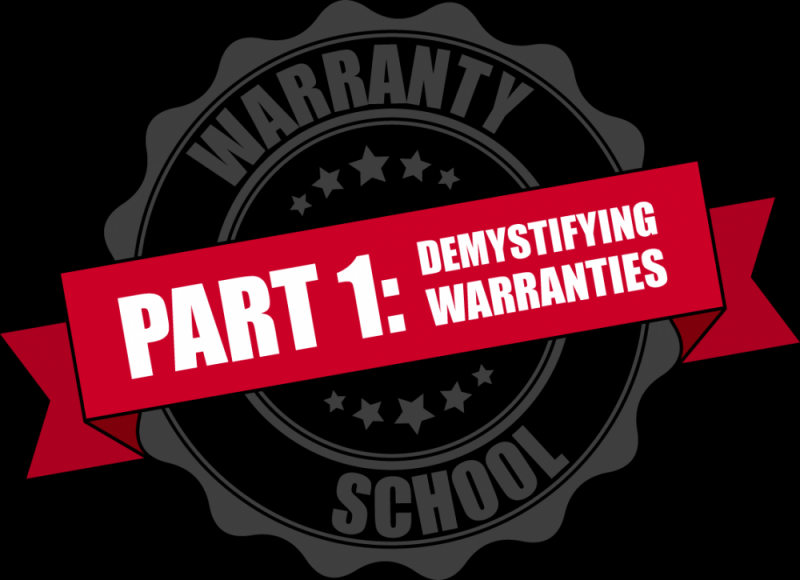Part 1: Demystifying Warranties

Warranty Series Introduction
If you’re investing in a new computer, smartphone, tablet, or other electronic device your hope is that it’s going to last. But what if something goes wrong? Depending on the problem, for some devices it makes sense to get a repair while for others the cost of repair might make replacement a better option. In either case, a warranty can be the only thing that stands between you and an expense you didn’t bargain for.
Of course, the term “warranty” is often used generically. In fact, there are basic warranties, extended warranties and service plans, each with its own limitations, advantages and drawbacks and it’s important to know the difference. To decide whether a basic warranty, extended warranty or service plan makes sense for you, it’s important to first understand what they are and how they work.
Part 1: Standard warranties, extended warranties and service plans: what’s the difference?
What is a basic warranty?
Normally, when you purchase a high-ticket item, the manufacturer makes a commitment to stand behind the product. This is called a manufacturer’s warranty, standard warranty or basic warranty. In short, the manufacturer promises to repair, replace or refund the cost of a defective product for a certain period of time. Although not required by law, basic warranties are included in the purchase price of many devices and products. Of course, every basic warranty is unique, with varying durations and covered defects.
What’s an extended warranty?
Often when you buy a device or other product, the manufacturer might offer you the opportunity to purchase an extended warranty that prolongs the terms of a basic warranty, typically from 1-3 years. Unlike standard warranties, these manufacturer-branded warranty programs – like Apple Care or Samsung Premium Care – cost extra and are sold separately. On the plus side, extended warranties will sometimes include additional protections as well as a longer term. So, for example, you might get limited coverage for accidental damage (like a cracked screen) in addition to protection against failures that are no fault of your own (a failed hard drive, for example). It’s also important to note that some manufacturers offer several flavors of extended warranty depending on the type of product, with varying terms and coverage, or warranties that cater to the specific needs of businesses or consumers.
What is a service plan?
Depending on where you buy your product, you might also be offered the opportunity to buy an extended service plan. These plans are like extended warranties, but are fulfilled by third parties rather than the manufacturer. In most cases, they kick in after the basic warranty expires. They are often cheaper than manufacturers’ extended warranties but might not be as generous in terms of the defects they cover or the repairs they’ll provide. They also might not give much choice in terms of who repairs your product and they may not guarantee to use the same parts as the original product.
All warranty programs are limited by conditions and restrictions. It’s important to understand the basics of how a warranty works in order to make an informed decision about which one is right for you.
Simple answers to common questions about warranties
How long does a warranty last?
It depends. The only way to find out is to check the warranty document to see when it begins and when it expires, as well as any conditions that may void coverage.
What parts and repair problems are covered by warranty?
Again, it depends. Read to see if any parts of the product or certain types of repairs are excluded from the warranty. In some cases, warranties oblige you to pay for labor costs. Also, it’s worth keeping in mind to look for criteria that could prove costly or problematic to comply with, such as a requirement that you ship heavy or large objects to a distant address for service, or that you return the item in the original box. The majority of laptop warranties will cover hardware problems that are not caused by the owner, such as defective keyboards, monitor problems, modem or other issues with internal components. A laptop warranty will also spell out what actions on your part will void the warranty. Something as simple as opening the case and breaking a seal can be enough to void a warranty, even if you just wanted to take a peek inside.
How do I enforce a warranty?
It depends (are you sensing a theme here?). It’s often the manufacturer who provides you with a warranty but it can also come from the seller or even a third party (if it’s an extended service contract). Check the contact information and inquire before buying if you’re still uncertain. But expect to be asked to provide some proof that the product is still within the warranty period (either a receipt or some other proof of purchase).
Who performs warranty repairs?
Large technology vendors such as Apple, Lenovo, HP and Toshiba will perform warranty repairs but also have designated authorized service providers (ASPs). ComputerCare is qualified to service Apple, Lenovo, HP and Toshiba products covered under their warranty. We use the same parts and specifications as the manufacturers. Service conducted by anyone other than the manufacturer or an authorized service provider typically voids the warranty. In the warranty of a laptop or a smartphone the manufacturer will state how repairs will be completed and whether they will use new, used or refurbished parts. The warranty will also provide details on where servicing will take place.
What is a limited or conditioned warranty?
Certain warranties provide coverage only if you keep or use the product as directed. For example, a warranty may cover only personal uses—as opposed to business uses—of the product. As such, it’s important to check that the warranty will meet your needs.
Is an oral warranty binding?
Don’t take a salesperson’s word that the manufacturer will provide free repairs; make sure to get it in writing. If not, you may not be able to get the service that was promised.
Our next installment on warranties will help you determine if you’re a candidate for an extended warranty and what to consider before making the leap.










